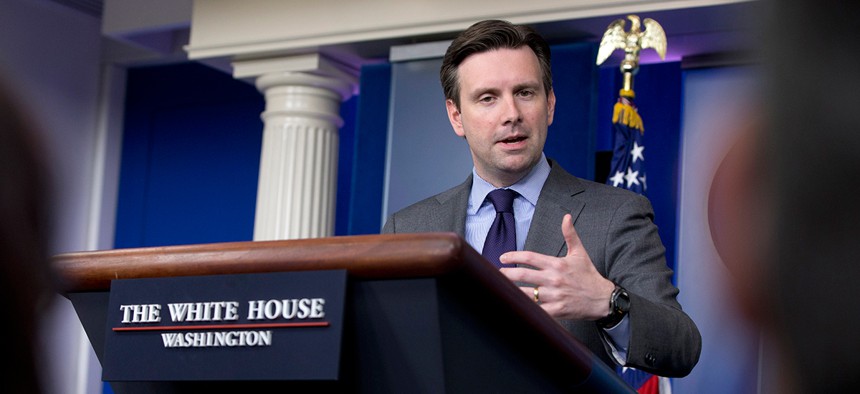The White House May Be Coming Around to the Senate Iran Deal
White House Press Secretary Josh Earnest was vaguely optimistic on Tuesday about the president’s thoughts on the latest version of the bill.
For weeks, the White House has said it would veto proposed Iran legislation in the Senate. Now, after a crucial bipartisan agreement between the Senate Foreign Relations Committee's top members, the administration may be softening its threat.
White House Press Secretary Josh Earnest said Tuesday that President Obama would not necessarily reject the bill proposed by Senate Foreign Relations Committee Chairman Bob Corker, R-Tenn., which would require greater congressional review of a potential deal to curb Iran's nuclear program. Corker and the committee's new ranking member Ben Cardin, D-Md., reached a compromise Monday night to alter parts of the bill, in ways that Earnest said the administration would consider accepting.
"The president would be willing to sign the proposed compromise that is working its way through the committee today," Earnest said.
Asked whether the newest version the bill is better than the last, he said that "there's some reason to think that."
"This is what we anticipate they're going to discuss," said Earnest, referring to the legislation headed to the markup scheduled for later this afternoon, and the version that Obama would consider signing. "But again, I can't say anything definitively about this until there has been an actual markup and debate within the committee and a vote."
During an appearance on MSNBC's "Morning Joe" Tuesday morning, Corker said he and Cardin had "reached a bipartisan agreement that keeps the congressional review process absolutely intact, full of integrity."
The latest version of the bill calls for a 30-day congressional review of a potential deal, down from the 60 days proposed in the Corker version. After that, if Congress passed a bill on the deal, the president would have 12 days to act on it. In the case of a veto, Congress would have up to 10 days to respond.
A framework agreement between Iran, the U.S. and five other nations was announced earlier this month after marathon negotiations. A final deal, which negotiators hope to reach in June, would grant relief from nuclear-related sanctions on Iran contingent upon the country's reduction of its uranium stockpile and installed centrifuges under the supervision of the International Atomic Energy Agency.
Priscilla Alvarez contributed to this article.




